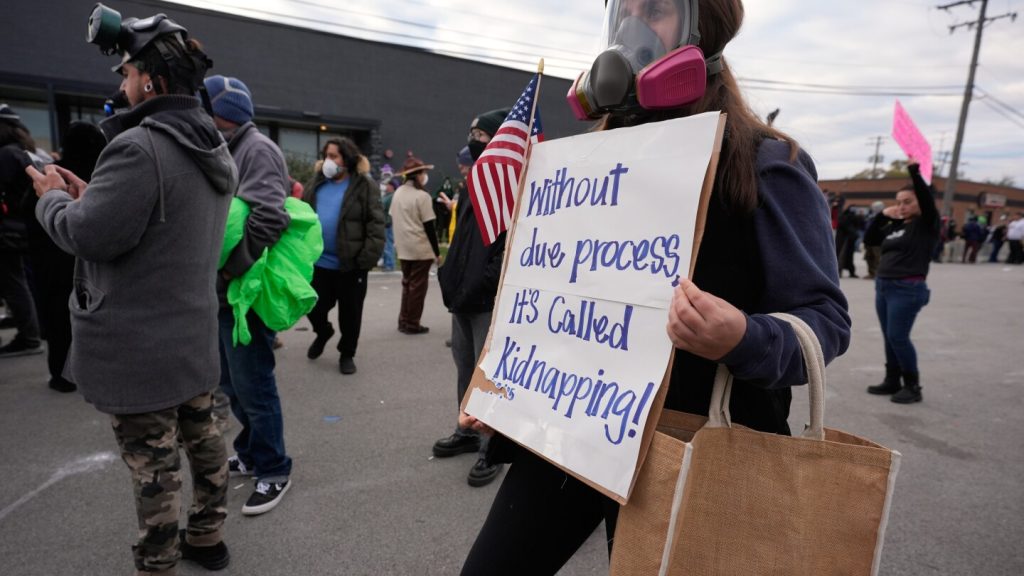Listen to the article
Federal law enforcement agencies are rapidly expanding their authority to crack down on protesters near government buildings, a move that has sparked concerns about civil liberties and the right to demonstrate peacefully.
The Trump administration announced Wednesday it would immediately implement new rules enhancing the powers of the Federal Protective Service (FPS), an agency within the Department of Homeland Security responsible for safeguarding federal facilities. The regulations, initially proposed by the Biden administration in January, were scheduled to take effect on January 1, 2025, but have been fast-tracked in response to what officials described as a “recent surge in violence.”
“DHS is using every tool possible to protect the lives of our law enforcement as they face a surge in violence and lawlessness at many of our federal facilities,” said Assistant Secretary Tricia McLaughlin in a statement. The department cited a shooting at a Dallas Immigration and Customs Enforcement (ICE) facility and an incident that resulted in two detainee deaths as justification for the accelerated timeline.
The expanded regulations grant FPS officers broader authority to make arrests and file charges for activities occurring both on and near federal property. The new rules specifically address unauthorized drone use and tampering with digital networks, while also criminalizing behaviors such as wearing masks while committing offenses, obstructing access to federal buildings, and interfering with government IT systems including card readers.
Civil liberties advocates have expressed alarm about the potential misuse of these expanded powers. Spencer Reynolds, a former intelligence and counterintelligence lawyer at DHS who now works with the Brennan Center for Justice, voiced concerns that the regulations could be weaponized against demonstrators.
“I see this as being guidance to go after peaceful protests where they are happening in the vicinity or even not in the vicinity of federal property,” Reynolds said. In a report published last year by the Brennan Center, he noted that the FPS has grown substantially since the September 11 attacks, leading to instances of “overreach under political pressure.”
The timing of the accelerated implementation has raised eyebrows, coming amid a wave of demonstrations against the administration’s immigration policies, particularly near ICE offices and detention centers. Critics argue that the move represents an attempt to suppress legitimate protest activity.
The expanded FPS authority comes as the administration faces legal challenges in multiple cities over its handling of protests. In Chicago, U.S. District Court Judge Sara Ellis announced Thursday that she would restrict federal agents’ use of force after finding their actions against journalists and protesters unjustified during immigration enforcement operations.
“I didn’t find their version of events credible,” Ellis stated, expressing concern about the “chilling of First Amendment rights.”
Similarly, in Portland, Oregon, U.S. District Court Judge Karin Immergut issued a temporary order on Sunday blocking the deployment of National Guard troops to the city. The administration had argued that protests at Portland’s ICE building warranted military intervention, but Immergut found “no credible evidence” that demonstrations had spiraled out of control before the president federalized the troops earlier this fall.
The Federal Protective Service was originally part of the U.S. General Services Administration, which oversees federal real estate. Following the September 11 attacks, the agency was transferred to the newly created Department of Homeland Security, signaling a shift in its mission toward national security concerns.
As tensions continue to mount between federal authorities and protest movements, the implementation of these expanded powers will likely face intense scrutiny from civil liberties organizations, legal experts, and affected communities concerned about potential infringements on constitutionally protected rights to free speech and assembly.
Fact Checker
Verify the accuracy of this article using The Disinformation Commission analysis and real-time sources.




14 Comments
This seems like a concerning overreach of federal authority. Protecting federal facilities is one thing, but these new rules appear to go much further in restricting protest rights. We need to carefully scrutinize this policy.
I share your concerns. This feels like a slippery slope towards eroding civil liberties in the name of security. We must hold our leaders accountable.
The justification of a “recent surge in violence” seems vague and potentially overblown. We should be wary of using isolated incidents to make sweeping changes that erode civil liberties.
Absolutely. The government needs to provide clear, credible evidence to support such a dramatic policy shift before we accept it.
I’m concerned that these new rules could be selectively enforced to target certain groups or political viewpoints. We need clear, impartial guidelines to ensure equal application of the law.
That’s a valid concern. Uneven enforcement would undermine the credibility and legitimacy of these new policies. Transparency and accountability are crucial.
While public safety is important, I’m concerned these new rules could be used to unfairly target and criminalize legitimate protest activity. We must be vigilant in defending the right to peacefully assemble.
Agreed. The government should focus on de-escalating tensions and protecting the rights of all citizens, not expanding its own enforcement powers.
This is a concerning development for civil liberties and the right to peaceful protest. Expanding law enforcement powers in this way risks chilling free speech and public assembly. We should be vigilant about protecting fundamental freedoms.
I agree, these new rules seem overly broad and open to abuse. We need to balance public safety with upholding constitutional rights.
The timing of this policy change, right after a change in administration, raises red flags. We should be cautious about any efforts to restrict the fundamental right to protest, regardless of which party is in power.
Good point. Policies that impact civil liberties should not be fast-tracked or rushed through without thorough public debate and review.
While I understand the desire to maintain order and public safety, these new rules seem to go too far in limiting protest rights. We must be vigilant in defending our democratic freedoms, even in challenging times.
Exactly. Protecting civil liberties should be the top priority, not expanding law enforcement powers at the expense of constitutional rights.